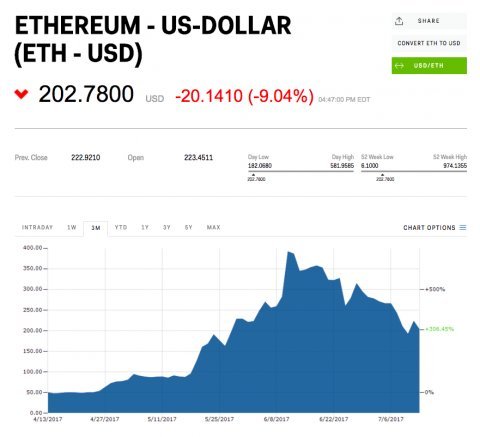
Bitcoin mining gets more difficult over time, and so it now takes more electricity and money to mine for the cryptocurrency than ever before.
The rise of ether, another cryptocurrency, and the appreciation of bitcoin could help maintain the profitability of bitcoin mining, despite increasing costs and difficulty.
It's getting more difficult to mine bitcoins, but that doesn't mean miners are packing up their servers en masse and seeking greener pastures.
The number of bitcoins available for mining has decreased from 50 BTC per bitcoin "block" when the cryptocurrency first came onto the scene to 12.5 BTC per block, according to Autonomous NEXT, a financial technology analytics service. It is set to decrease to 6 BTC on June 19 2020, according to bitcoinblockhalf.com, a bitcoin countdown site.
Bitcoin mining is the process by which bitcoin "blocks" are unlocked. Miners are rewarded with blocks when they successfully solve complex algorithmic math problems using computer software. In order to control the supply of bitcoin, its underpinning technology was designed so that those math problems would get more difficult.
In the early days of the technology, people with a few computers were able to mine hundreds of coins in three to four days. That's not what the landscape looks like today, according to Sebastian Quinn-Watson, a consultant with Blockchain Global, a bitcoin mining firm.
"Today, about 1,700 bitcoins are generated a day," he said. "Basically, we are all fighting over one coin every 10 minutes."
"Since mining has become so much more difficult, it requires more electricity, and as a result, more money," Quinn-Watson said. His firm halted expansion of its Chinese bitcoin mining facilities eight months ago.
But Quinn-Watson thinks two factors could make up for a spike in cost and difficulty and sustain bitcoin miners moving forward.
"Ironically, the rise of ether is one trend that could help bitcoin miners," he said.
Ether, the bitcoin rival, which is powered by Ethereum blockchain, is up over 2,000% since last year. Up until June, the cryptocurrency was on track to surpass bitcoin as the world's largest cryptocurrency by market cap, according to Coindesk, but its share of the market has since pulled back.
"Many miners without the wherewithal to compete may completely shift over to mining ether tokens," Quinn-Watson said."Less participants means better economies of scale for firms that stay in."
Miners could also benefit from future appreciation in bitcoin's price, according to Quinn-Watson. If bitcoin's appreciation were to outpace the rise in the cost of mining, then the profitability of the business would be unaffected.
To be sure, bitcoin is up about 250% since last year, but it has recently experienced extreme swings in its price. Some miners have attributed this volatility to an ongoing civil war between crypto-power brokers over the future structure of the cryptocurrency.
This, however, doesn't bother Quinn-Watson. He told Business Insider volatility is exciting.
"It will make the system stronger and drive more growth," he said. "So we welcome the uncertainty and see this as necessary aftershock of the Cambrian explosion that is Blockchain."
Source: businessinsider.com
Copying/Pasting full texts is frowned upon by the community.
Some tips to share content and add value:
Repeated copy/paste posts could be considered spam. Spam is discouraged by the community, and may result in action from the cheetah bot.
Creative Commons: If you are posting content under a Creative Commons license, please attribute and link according to the specific license. If you are posting content under CC0 or Public Domain please consider noting that at the end of your post.
If you are actually the original author, please do reply to let us know!
Thank You!
Hi! I am a robot. I just upvoted you! I found similar content that readers might be interested in:
http://www.businessinsider.com/ethereum-price-rise-could-help-bitcoin-mining-2017-7